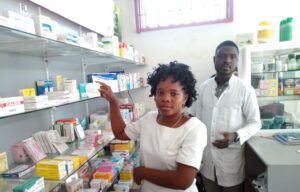
PMI funding trained pharmacists at St. Euphrasia Hospital in Cotonou, Benin, on the national supply chain system for health commodities, enabling them to access subsidized malaria medicines and other supplies. Photo by ARM3
Top-quality malaria medicines are now available at rock-bottom prices in sub-Saharan Africa. As both a major buyer of these lifesaving treatments and a funder of healthcare training, the U.S. President’s Malaria Initiative (PMI) plays a vital role in ensuring access to essential care in nations dealing with the challenge of malaria.
Private care and treatment can vary wildly, leaving unsuspecting patients vulnerable. Taking phony pills paid for at inflated prices is still a common—and deadly—risk for many patients seeking care from the private sector. Private providers, too, can face challenges that prevent them from improving patient care, such as volatile supply chains or outdated training on care guidelines.
In countries like Benin, this presents a major problem because more than 65 percent of people seek malaria treatment from private clinics, pharmacies, and hospitals. To help all patients receive the same quality of care available in Benin’s public sector, PMI assisted the National Malaria Control Program in the Ministry of Health to engage the private sector through a pilot accreditation program. Implemented through the PMI-funded “Accelerating the Reduction of Malaria Morbidity and Mortality Project,” the pilot offered private providers subsidized access to quality-assured malaria commodities in exchange for completing training on national care guidelines and information systems.
PMI funded training for more than 400 health workers, enabling 145 private health facilities in four health zones to be accredited. The training equipped health workers like D’Almeida Bilou, a midwife at Clinic Hope in Djougou with the knowledge and skills to better care for her patients.
“This training enlightened me,” D’Almeida said. She also received access to subsidized commodities that allowed her to deliver safe and reliable treatment at more affordable prices. When the project checked patient fees across participating facilities it found 96 percent respected the strict prices set by the ministry. Further, a survey after the pilot found that most respondents were willing to go even further and explore ways to offer free treatments.
The training also helped D’Almeida and other providers to track how much medicine they were using and order more when needed through the national logistics management information system. As a result, data reported to the ministry by participating private facilities rose from 78 percent in January 2017 to 96 percent in June 2018, giving the ministry more complete and realistic data on where and how many malaria commodities are needed.
Ministry engagement with the private sector to improve malaria care proved to be a win-win. At the close of the pilot, most participants welcomed the idea for a more permanent accreditation program and a closer working relationship with the ministry. Taking this public-private partnership nationwide could equip more providers like D’Almeida to deliver the quality malaria care their patients deserve.
